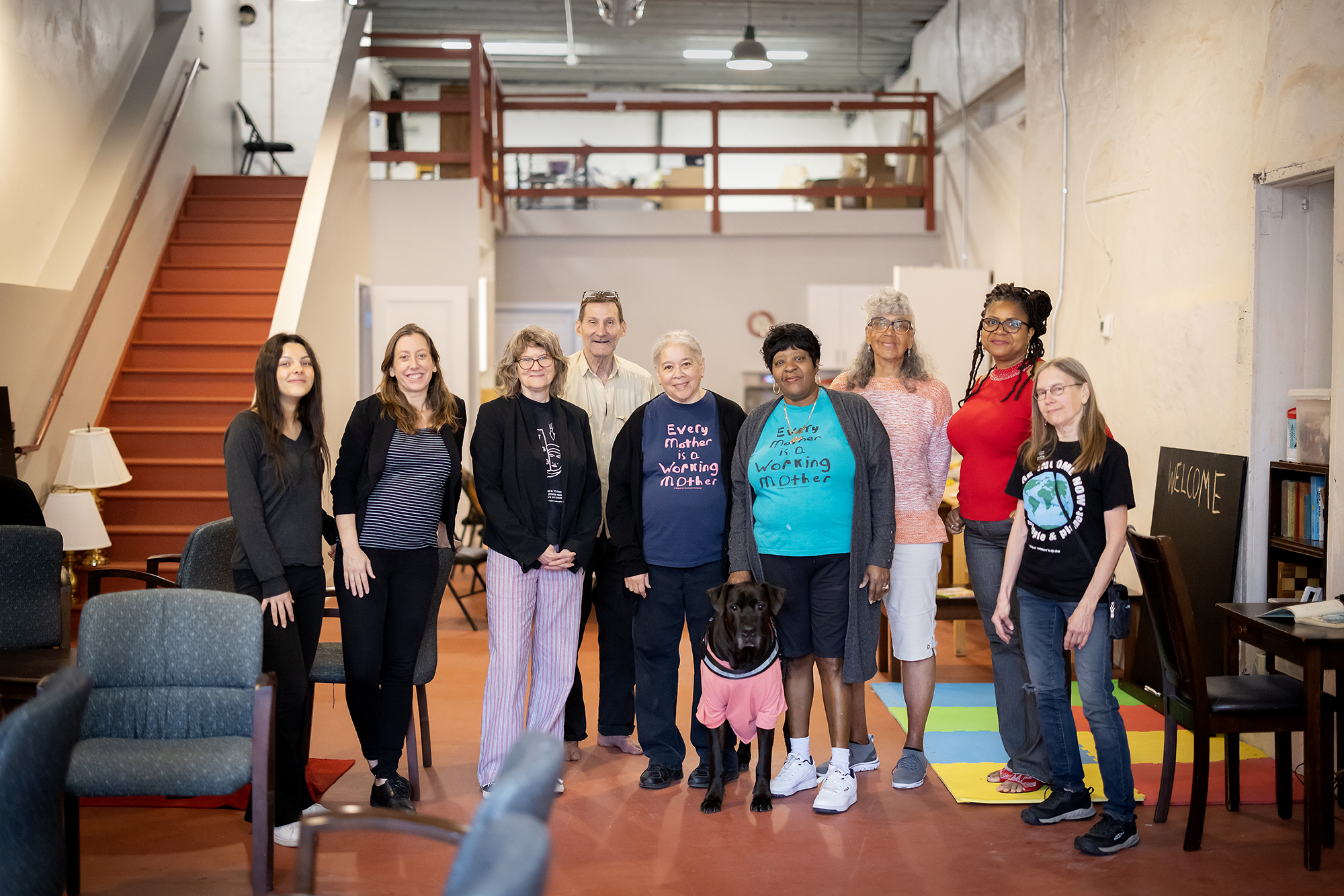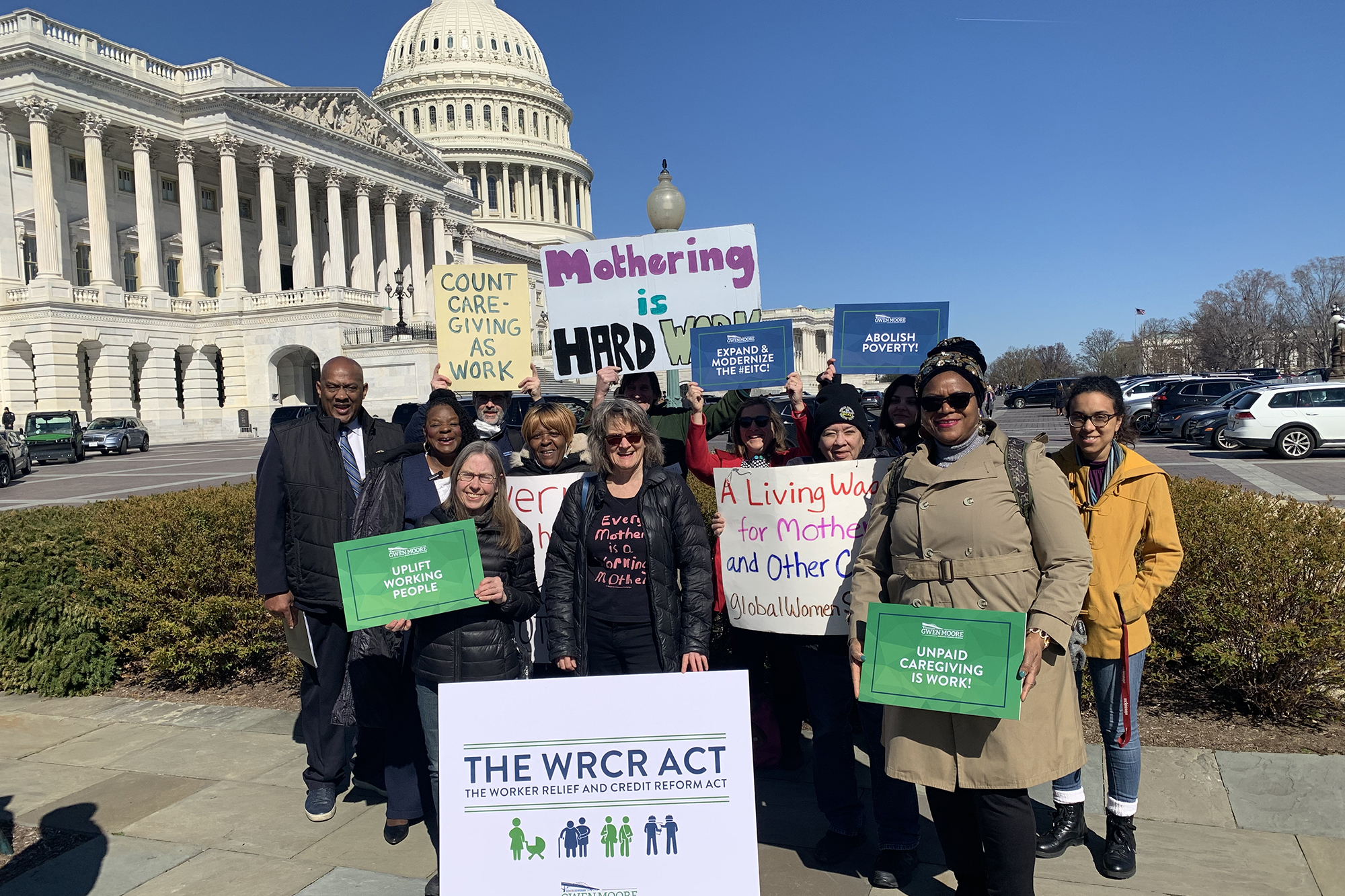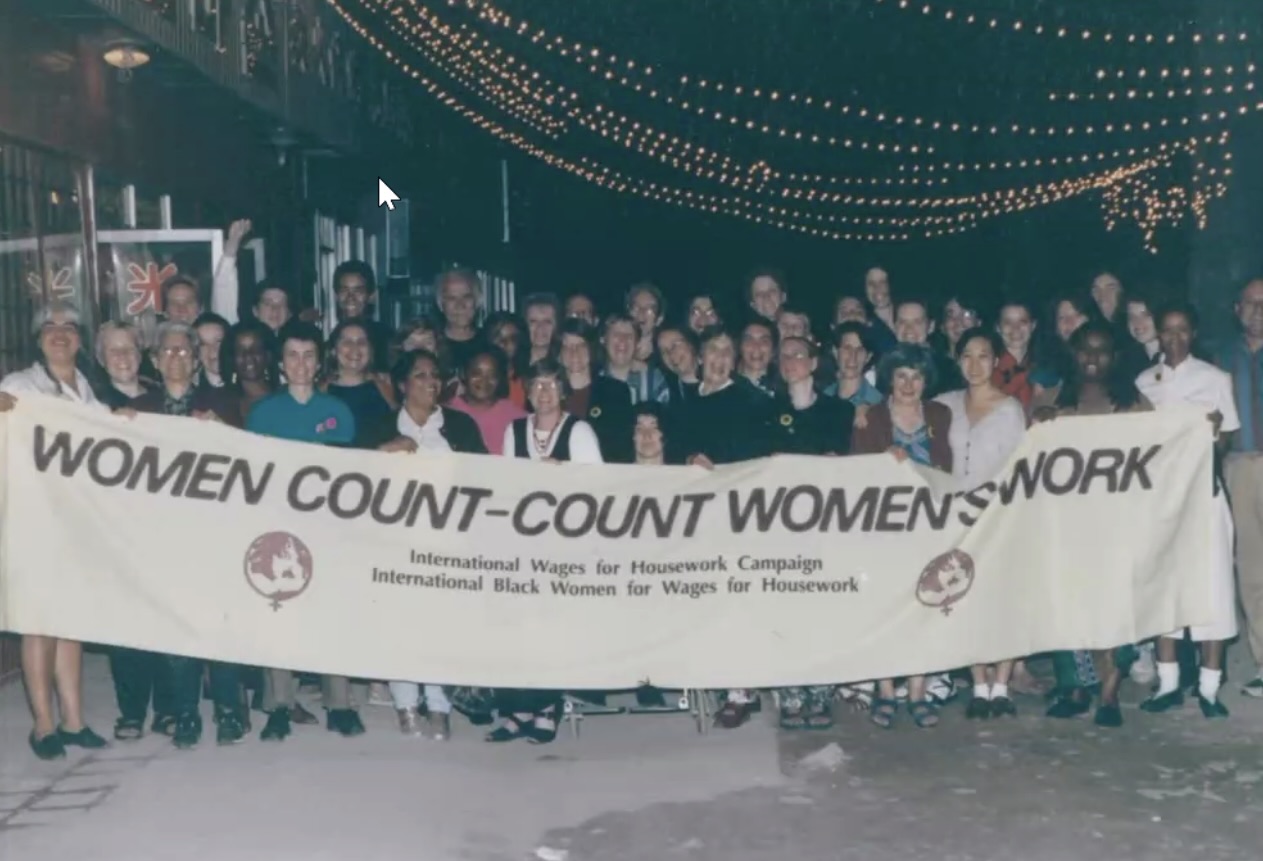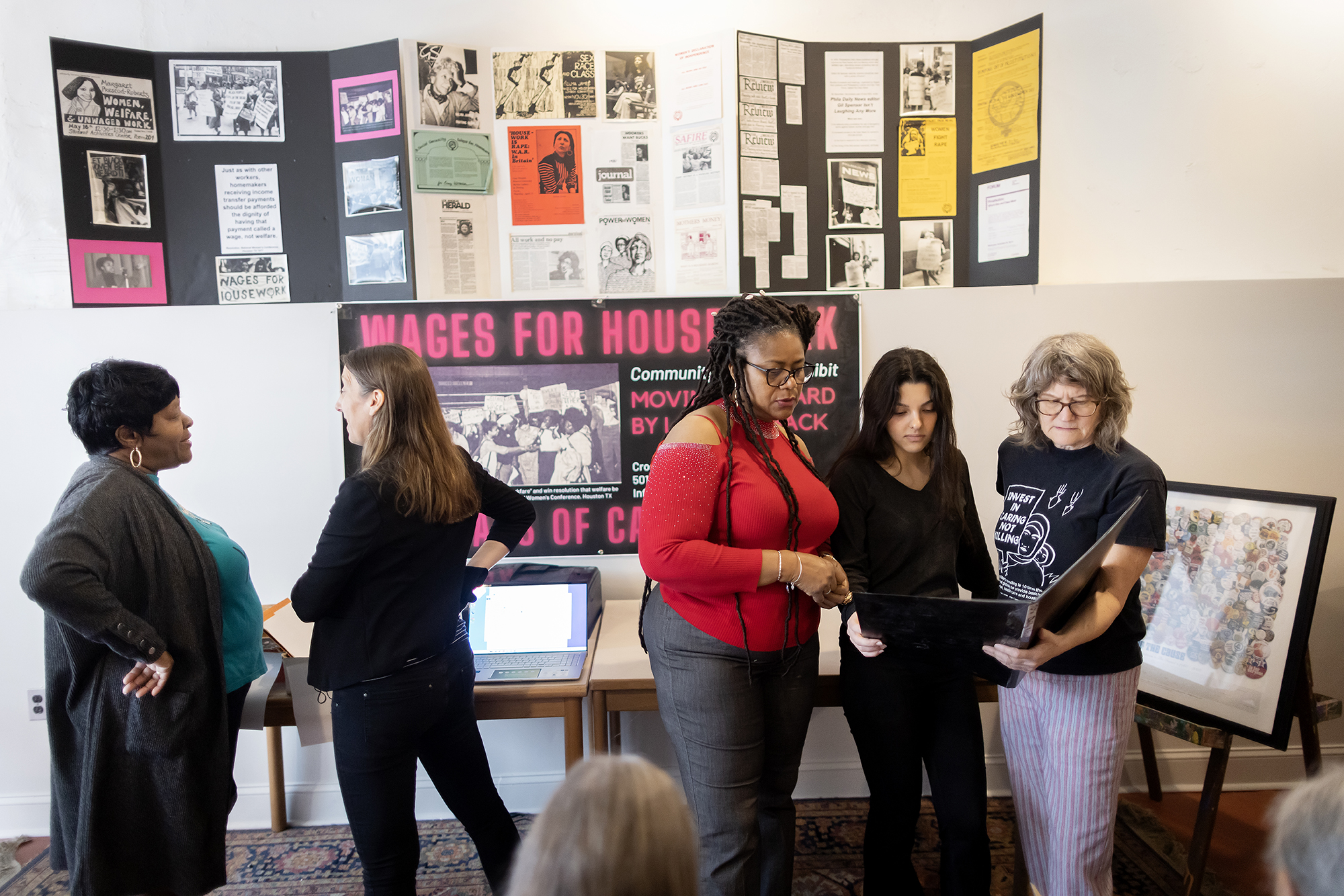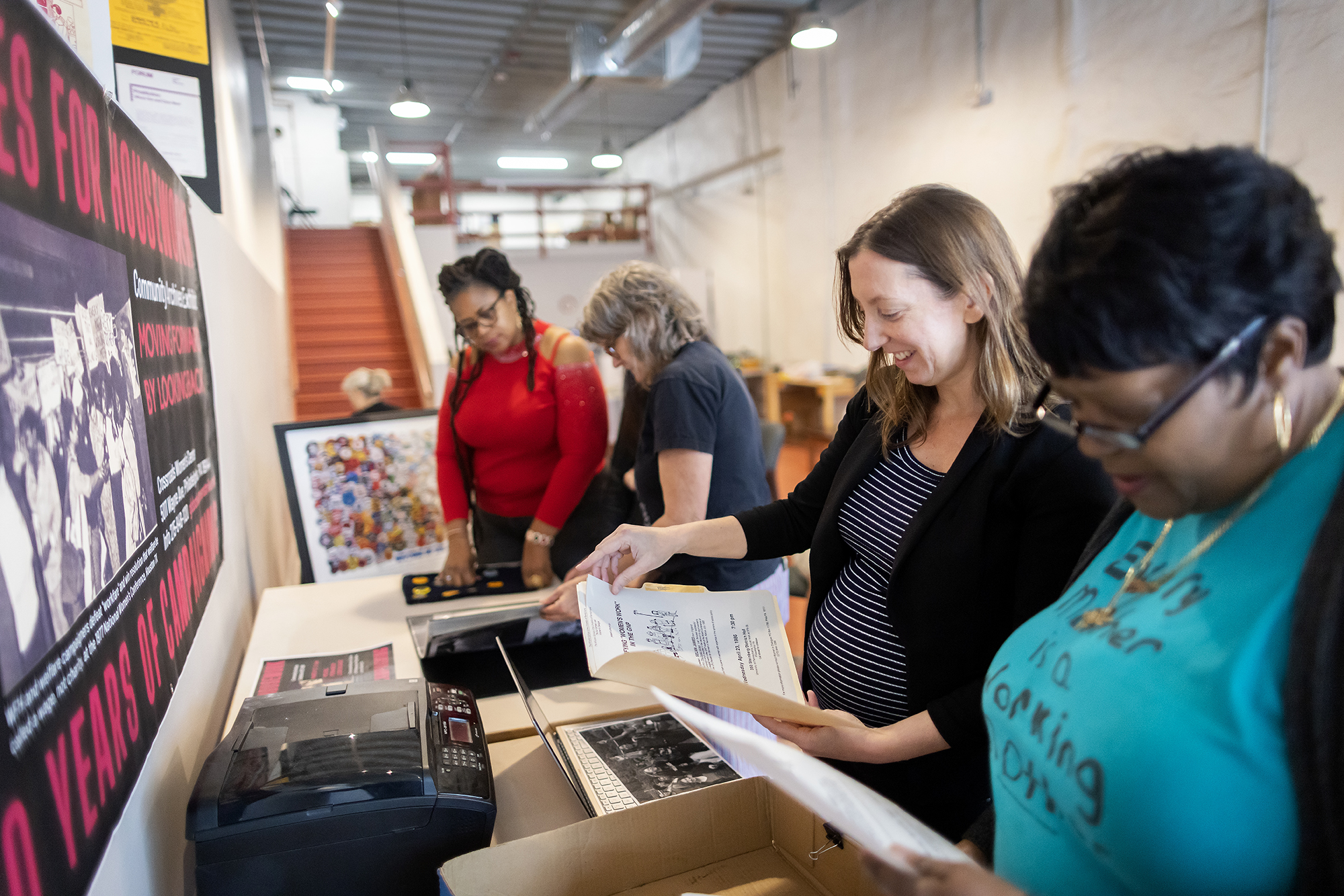
Wayne Avenue in Germantown, Philadelphia is tree-lined and bustling, home to neon nail salons and hole-in-the-wall hoagie shops. Along the way, a former hardware store at 5011 Wayne Ave. bears a new sign: Crossroads Women’s Center.
Inside, volunteers clean, organize, and help with light carpentry. One shows off the children’s center, complete with books and dolls, chalk and blocks, all donated from family and friends. Another stocks the fridge. She came here to do her work hours for the local grocery co-op, and never left. People tend to do that at Crossroads, says Barbara Gurley of Women of Color in the Global Women’s Strike, one of the volunteer coordinators. They come for help and then stay to help others.
The Crossroads Women’s Center is a local, community-based center that advocates against poverty and discrimination. It is home to the Global Women’s Strike and other groups campaigning for a guaranteed care income. The Center also houses an archive of more than 50 years of this work, including the Wages for Housework campaign, which was started in 1972 and is carried on today by Selma James. The campaign spread as an international grassroots movement, rejecting the pervasive norm of housekeeping as “unproductive” and demanding financial remuneration and recognition for unpaid and undervalued domestic labor.
“The origin of the movement is really to challenge how we understand all this unpaid work,” says Pilar Gonalons-Pons, Alber-Klingelfhofer Presidential Associate Professor in the Department of Sociology in Penn’s School of Arts & Sciences (SAS). Gonalons-Pons is helping the Center archive the Wages for Housework material, including photos, banners, documents, and buttons. Instead of viewing housework and care work as an idealized practice that’s done out of devotion and love, the movement puts this labor in economic terms, noting that people are in economically precarious situations because they’re doing underpaid and undervalued labor, Gonalons-Pons says.
Housework and care work are vital, an essential truth laid bare by the pandemic, she says. “People are suddenly like, ‘Oh, hold on a second, like all these people are actually doing extremely important work. We’ve just been running around taking for granted that this work is being done for us and we don’t pay attention to it, and we don’t value it and respect it, and we don’t compensate it.
“The issue of the devaluation of care is very much with us today. And it impacts people across class, across race, across sexual orientation. It is cross-cutting, it is unresolved, and we’re wrestling with this. Learning from the work of this movement can help us provide a better perspective and better understanding of how to tackle that,” Gonalons-Pons says.
Coming together through ‘valuing caregiving work’
Phoebe Jones, who introduces herself as “one of the old-timers,” has been involved with the Center for almost 50 years. With a grant from the Mellon Foundation, Jones helped to launch the Center’s new physical location on Wayne Ave., which opened to the public on June 9. “What brings us all together is valuing caregiving work,” Jones says. “We are all about tackling poverty, beginning with mother’s and children’s poverty. But that takes us a lot of places.”
Teresa “Tree” Muldrow of Women of Color in the Global Women’s Strike, joined the Center in 2019 as a member of the Poor People’s Campaign, an anti-poverty movement inspired by Martin Luther King Jr. “But prior to that, I had been advocating for children,” she says. “I’d been a special needs teacher and coordinator for years and I was involved with children, mostly poor children, you know, families that were disrupted by the system mostly because of poverty.”
Many of the members involved at the Center came to advocate for their children and grandchildren in what Gonalons-Pons calls “the incorrectly-named foster care system.”
Carolyn Hill of Give Us Back Our Children first called Crossroads for support when her nieces, who she had been caring for, were going to be rehomed to a wealthier foster family. Although she lost the case, Hill continued to advocate for children to remain with their families, testifying on the subject at Philadelphia City Council. “So many mothers testified there that they had to extend the hearing,” Jones says.
Out of those testimonies, Philadelphia City Council convened the Special Committee on Child Separations, which recommended, among other things, abolishing neglect as a category and opening up family court hearings. “We intend to get these recommendations implemented,” Jones says.
“There’s a lot happening now on ending childhood separation, abolition of the foster care system and so on, which we’re all for,” Jones says, but some advocates are calling to put money into social services, which she opposes.
“It needs to go directly to the mother,” she says. “Because if the mother had the money in the first place, the kids would not have been taken. So for us, the critical thing is the care income. You want to solve the child welfare, get the money to the mother. They are willing to put more money into anything else rather than give the money to the mothers.”
More than half of all Black children in America are subjected to a child welfare investigation before they reach age 18 says Dorothy Roberts, the George A. Weiss University Professor of Law & Sociology, Raymond Pace & Sadie Tanner Mossell Alexander Professor of Civil Rights, and professor of Africana studies. Roberts, a Penn Integrates Knowledge Professor with appointments in Penn Carey Law and SAS, first became involved with Crossroads when she helped to draft a brief in support of Hill’s case.
“I see it as an important community-based resource and resistance against the harms of what I call the family policing system, as well as the criminal legal system,” she says.
Roberts advocates for abolishing the foster care system and replacing it with policies and practices that support family caregivers, including cash transfers and community support. “This is where we can see the tie between opposing family policing and supporting wages for housework, because Wages for Housework is a campaign to provide income for caregiving.”
‘A different way of thinking’
From its inception, the Wages for Housework campaign was intersectional, says Gonalons-Pons. “Feminism has not always been white and middle class,” she says. “There have always been a lot more groups and diversity underneath.” The Center’s archive will show this history along with the history of socialist feminism, challenging a conception of the movement dominated by Gloria Steinem and Betty Freidan.
The campaign “demonstrates this broad vision that is able to connect the dots across the issues and bring people together to tackle them in a way that’s grassroots, that prioritizes the people who are facing the issues in the most personal and direct manner,” Gonalons-Pons says.
The movement includes a history of global women’s strikes and the successful lobbying against welfare reform in 1977 at the Houston Women’s Conference, which both Jones and Pat Albright, an outreach coordinator at the Crossroads Women’s Center, attended. There, Black Women for Wages for Housework and the Welfare Rights movement won a resolution that welfare be called a wage, not charity. The Wages for Housework campaign also advocated for sex workers, noting that women are often forced into sex work by poverty.
For Alexa Selen Tetik, a rising second-year from Kazakhstan and Turkey majoring in sociology and gender, sexuality, and women’s studies, the idea of wages for housework was at first surprising. Tetik has a work-study research position archiving the Wages for Housework campaign. “Coming to the Center, talking to everyone and also reading some of the actual theory and the work behind this campaign. ... I thought it was just revolutionary. It was such a different way of thinking that I never came across before.”
Kazakhstan and Turkey are both male-dominated countries, Tetik says, and the work felt personal to her. “I started thinking, you know what, why aren’t women valued for their work, or their contribution to the economy through the housework that they’re doing?”
Tetik was most interested in the material from the Fourth World Conference on Women, held by UN Women in Beijing in September 1995, attended by more than 17,000 participants from around the world. The resulting declaration, which was adopted by 189 countries, included a resolution stating that women’s work should be valued and counted in countries’ Gross Domestic Product (GDP), Tetik says. “That was just so impressive to me.”
After Beijing, the United Nations mandated that countries create satellite accounts, which calculate what the GDP would be if unpaid work was valued economically. The satellite accounts are “a way of making visible the volume and value of unpaid work,” Gonalons-Pons says.
Globally, the Wages for Housework campaign was instrumental in advocating for the inclusion of care work, and the archives are rich in material that reflect this role, Gonalons-Pons says. “That was a big win of the movement.”
“And fast forward, we’re thinking about today,” Gonalons-Pons says. “The Child Tax Credit is essentially an example of a what a Wages for Housework type of policy is demanding—basically an income transfer that recognizes that having kids means needing money, not just because children are expensive, but because there’s a labor component.”
The COVID emergency packages were also an articulation of the Wages for Housework movement, she says. And there’s now a broader demand for care income, which would cover unpaid care for the elderly or people with disabilities.
Varied paths to the Center
Everyone has different reasons for getting involved with Crossroads Women’s Center. “A lot of us, for whatever reason, come here, stay here,” says Gurley. She first met the group at a West Philadelphia church in 2015 and became close with another volunteer, whose son was beaten by the police for riding his bike the wrong way down a one-way street.
“I started going to the court hearings. And after that was solved, I stayed for the other campaigns,” Gurley says.
“I grew up in the Midwest, mostly in Wisconsin,” says Albright. “I felt like my father had a job to support the family, which he really didn’t like, but he just carried on because he was supporting the family. My mother was dependent on him, and she didn’t have her own money and then my father, he retired and he died. And I said, ‘Wait a minute. Life must be about more than this.’”
Dean Kendall first came to Crossroads through the Payday men’s network, an ally organization that shares the goals of the Wages for Housework campaign. “The way they keep us down is by pitting us against each other,” he says. “That’s what this campaign is, to me. It’s about crossing divides.”
Coming together
In the back, the Center’s kitchen rustles with movement as lunch is prepared. The refrigerator opens and closes. Fruit is pulled out, then soup. Bread is cut. A simple repast is spread on a folding table. “We do a healthy lunch here on Fridays,” Jones says. “State food is so bad. State health care is pretty bad. And you know, so we feel we need to get some healthy food in in us to carry on the work.”
Volunteers often gather on Fridays, as much for community as for the work. “The thing I liked was the collective spirit, the advocacy, the self-help, the self-governing, the autonomy,” says Muldrow. Or, as the Crossroads Women’s Center puts it, “each one, teach one.”
“We don’t have other people speaking for somebody; we don’t have do-gooders,” Jones says. “It’s not about that. It’s about all of us, struggling from where we are at and coming together.”
The building that the Center occupies was formerly a hardware store owned by True Value. “There used to be a big sign that said, ‘Kane and Brown’s True Value Hardware Store,’” Albright says. “We wanted to change it to ‘True Value of Women’s Work.’”




